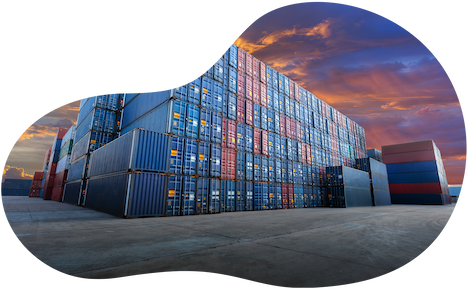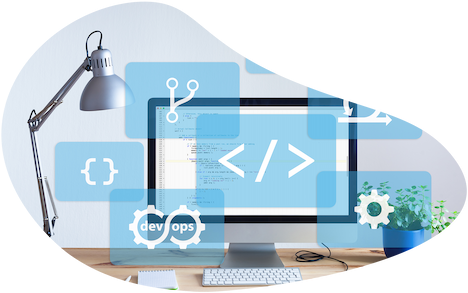Elevate Your Application Development With Containers
Companies that can deploy, run, and manage containers effectively have a major advantage when it comes to application development. ClearScale equips engineering teams with everything they need to get the most out of container technology and take their app development capabilities to the next level.
Achieve More With ClearScale and AWS
Faster Time to Market
Bring new features, updates, and products to market quickly, always delivering a consistent experience for customers across all operating systems and environments.
Simpler Operations
Deploy and manage containerized applications easily through efficient CI/CD pipelines, IaC, serverless architecture, and managed services.
Seamless Integration
Integrate and optimize your containers seamlessly with powerful AWS services that simplify the process of configuring governance, compliance, access management, security, and more.
Why Choose ClearScale as Your Cloud Containers Consulting Partner?
Deep AWS Container Experience
ClearScale has extensive experience with both container technology and container-related AWS services. For years, our expert architects and engineers have helped companies implement containers with best-of-breed AWS solutions, like Amazon Elastic Container Service (ECS), Amazon Elastic Container Registry (ECR), Amazon Elastic Kubernetes Services (EKS), and AWS Fargate.


Technical Expertise of Related Technologies
As an AWS Premier Consulting Partner with the DevOps competency, we can also help you adopt the latest and greatest DevOps practices to get even more value out of containers and microservices infrastructure.
Common Containers Use Cases
Application Migration
Containerize mission-critical applications to simplify the process of migrating to the cloud without having to make significant code changes.
Read moreOperations for Containers
Choose between multiple technologies (AWS ECS, AWS EKS, or Fargate) to run containerized apps. Standardize on a single set of tooling for monitoring and logging, with CI/CD automation to accelerate deployment cycles for containerized apps.
Read moreAI/ML
Train and scale machine learning models rapidly by using containers to distribute workloads to various compute resources.
Read moreFrequently Asked Questions
What is a container?
A container is a package of software that comes with everything an application needs to run successfully. Container packages typically include code, runtime environments, user interfaces, libraries, systems tools, and more. Containers are growing increasingly popular in modern application development for their standardized, scalable, and flexible nature. Cloud-native containers, in particular, have the potential to dramatically improve IT and application performance when implemented according to the latest best practices.
What are the benefits of using containers?
Containers offer several benefits. They enable a microservices-based architecture that makes it easier to manage, update, and troubleshoot complex applications. Containers also allow different development teams to utilize their preferred tools, languages, and settings because software units can be separated into unique environments. This separation promotes software unit isolation, which increases overall application resilience. Furthermore, containers are portable and consistent, leading to more agile, efficient development.
What container management tools does AWS offer?
There are three categories of AWS cloud containers services: registry, orchestration, and compute. Amazon Elastic Container Registry (ECR) makes it easy for developers to store, maintain, and deploy container images. On the orchestration front, AWS offers three solutions: Amazon Elastic Container Service (ECS), Amazon Elastic Kubernetes Service (EKS), and Red Hat OpenShift on AWS. AWS’ container compute services include AWS Fargate, Amazon EC2, and AWS App Runner. In addition to these services, AWS has two container tools: AWS App2Container and AWS Copilot.
What is container orchestration?
Container orchestration refers to the process of automating container administration and overhead. For example, AWS cloud containers services like Amazon ECS and Amazon EKS can take care of deployment, provisioning, load balancing, auto-scaling, and networking. These services enable organizations to leverage containers at scale within efficient CI/CD pipelines and serverless architectures. They also make it possible for organizations to maintain complex applications across hybrid environments that use batch processing.
What is Kubernetes?
Kubernetes is a container orchestration service that launched in 2014 in conjunction with the microservices movement. It’s a popular open source system for managing containers at scale. Organizations worldwide use Kubernetes today, which is why AWS built a dedicated Kubernetes service (Amazon EKS) that simplifies the workflow of running and growing Kubernetes-based applications, both in the cloud and on-premises.
What is Docker?
Docker is an open-source tool for developing and sharing container images. It makes it easy for developers to use native containerization capabilities and automate critical commands through an intuitive user interface. With Docker, developers can create lightweight, portable containers that come with version control, shared container libraries, and reusability. Docker also comes with Docker Hub, a massive repository of container images, as well as other helpful resources for using the technology.
How are containers related to DevOps?
Containers are an essential part of the modern DevOps process. Because containers are standardized, portable, and scalable software packages, teams across the organization (e.g., development and IT operations) can work together more effectively. Incorporating containers into DevOps speeds up development, increases transparency, encourages experimentation, and maximizes productivity. It boosts enterprise agility, which is becoming increasingly important in today’s fast-paced world.




















